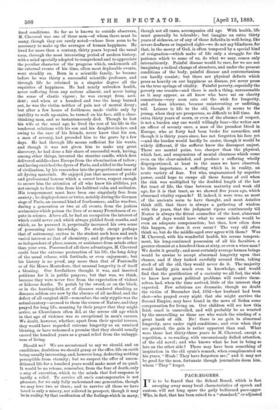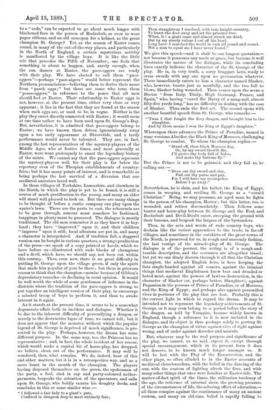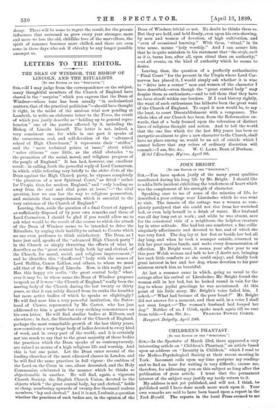PAC E -E GGE RS.
IT is to be feared that the School Board, which is fast sweeping away many local characteristics of speech and custom, will not long spare the gaily bedizened pace-egger. Who, in fact, that has been raised to a "standard," or adjusted to a " code," can be expected to go about much longer with blackened face in the person of Beelzebub, or even to wear paper ribbons, and an old saucepan for a helmet, as the great champion St. George?- Yet, as the season of Easter comes round, in many of the out-of-the-way places, and particularly in the North of England, a certain mysterious activity is manifested by the village boys. It is like the little stir that precedes the Fifth of November ; one feels that something is about to happen, and, surely enough, when the sun dances at Easter, the pace-eggers are ready with their play. We have elected to call them " pace- eggers "—perhaps " pace-aigers " would better represent the Northern pronunciation—believing them to derive their name from " pasch eggs ;" but there are some who term them " peace-eggers," in reference to the peace that all men should feel at Easter. Their relationship to Easter eggs is not, however, at the present time, either very close or very apparent ; it lies in the fact that they are found at the season when such eggs are, or used to be, in vogue. Neither is the play they enact directly connected with Easter ; it would seem at one time rather to have been used upon St. George's Day. But, nevertheless, it is admitted that pace-eggers belong to Easter ; we have known them driven ignominiously away upon a too early appearance at Shrovetide, and a tardy performance would never be tolerated. They are, in fact, among the last representatives of the mystery-players of the Middle Ages, who at festive times, and most generally at Easter, were wont grotesquely to enact the legendary history of the saints. We cannot say that the pace-eggers represent the mystery-players well, for their play is far below the repertory even of the Thespian establishments of country- fairs; but it has many points of interest, and is remarkable as being perhaps the last survival of a diversion that our mediaeval ancestors loved well.
In those villages of Yorkshire, Lancashire, and elsewhere in the North, in which the play is yet to be found, it is still a source of much gratification to the young, and many an elder will stand well pleased to look on. But there are many things to be thought of before a rustic company can play upon the squire's lawn. There are the parts to cast, the rehearsals are to be gone through, armour must somehow be fashioned, trappings in plenty must be procured. The dialogue is mostly traditional. The old men remember it as they knew it in boy- hood ; they have "improved." upon it, and their children ." improve " upon it still; local allusions are put in, and many a character is interpolated. And, if tradition fail, a doggerel version can be bought in various quarters, a strange production of the press—we speak of a copy printed at Leeds, which we have before us—illustrated with rude blocks of champions and a devil, which have, we should say, not been cut within this century. Thus, even now, there is no great difficulty in putting St. George upon the village green, if only the spirit that made him popular of yore be there ; but there is grievous reason to think that the champion—nowise because of Gibbon's depreciatory remarks—is declining in rural opinion. It would be well worth the while of some gentleman of influence in the 'districts where the tradition of the pace-eggers is strong, to put together an intelligent version of their play, to encourage a selected troop of boys to perform it, and thus to awake interest in it again.
As it stands at the present time, it seems to be a somewhat 'degenerate affair both in incident and dialogue. Whether it be due to the inherent difficulty of personifying a dragon, or merely to the destructive lapse of time, we cannot tell; but it -does not appear that the monster, without which the popular legend of St. George is deprived of much significance, is pre- sented in the play. Perhaps, however, the drama has some different purpose. In the same way, too, the Princess has no -representative ; and, in fact, the whole incident of her rescue, which would make a capital bit of horse-play, has dropped, -we believe, clean out of the performance. It may well be wondered, then, what remains. We do, indeed, hear of this and other matters, but it is in a retrospective way, and as a mere boast in the mouth of the champion. The players having disposed themselves on the green, the spokesman of the party, a fool, clad in cap and party-coloured nether- garments, bespeaks the attention of the spectators, and calls upon St. George, who boldly vaunts his doughty deeds, and concludes in this or some similar wise :— " I followed a fair lady to a giant's gate, Confined in dungeon deep to meet untimely fate;
Then straightway I resolved, with true knight-errantry,
To burst the door away and set the prisoner free. When, lo ! a giant came and almost struck me dead, But by my sturdy valour I cut off his head.
Long have I searched the world in vain all round and round, But a man to equal me I have never found."
We give this speech—and it shall be our longest quotation— not because it possesses any merit or grace, but because it well illustrates the nature of the dialogue, while its concluding lines exactly indicate the character of the St. George of the play. He is, in very truth, a sorry braggart hero, ready to
cross swords with any one upon no provocation whatever.
There immediately enters to him a character named Slasher, who, however, boasts just as manfully, and the two fall to blows, Slasher being wounded. Then comes upon the scene a Doctor " from Italy, Titaly, High Germany, France, and Spain," who, having "cured Sir Harry of a nang-nail, almost fifty-five yards long," has no difficulty in dealing with the case of Slasher. Thus ends the first act. The second opens with another boastful speech from St. George, who remarks :—
"'Twas I that fought the fiery dragon, and brought him to the slaughter, And by those means I won the King of Egypt's daughter."
Whereupon there advances the Prince of Paradine, named in some versions Almidor, the Black King of Morocco, challenging St. George to combat. To whom the champion replies :—
" Stand off, thou black Morocco dog, Or, by my sword thou'lt die, I'll pierce thy body full of holes, And make thy buttons fly."
But the Prince is not to be gainsaid, and they fall to, he
calling out :- " Draw out thy sword and slay, Pull out thy purse and pay, For I will have my recompense Before I go away."
Nevertheless, he is slain, and his father, the King of Egypt, comes in weeping, and reviling St. George as a " cursed Christian!' Being, we may presume, an aged man, he fights in the person of his champion, Hector ; but this latter, too, is wounded, and retires disconsolately.. Then follows some banter and horse-play between St. George and the Fool, and Beelzebub and Devil-Doubt enter, sweeping the ground with their brooms, and bespeak the largess of the bystanders.
Thus, in the acts and words of rode country boys, who declaim like the veriest apprentices to the trade, in far-off villages, and sometimes in the outskirts of the great towns of the North, is preserved for us, in rough and unseemly fashion, the last vestige of the miracle-play of St. George. The dialogue is of the poorest, the acting is of a rough-and- tumble description, and the costumes are altogether tinsel; but yet we can dimly discern through it all that the Christian champion, the adopted English hero, is here keeping the lists single-handed against all comers, against the inimical things that mediaeval Englishmen knew best and dreaded or hated most, against the powers of lawless destruction, in the character of Slasher (or, perhaps better, Slaughter) ; against Paganism in the persons of Prince of Paradine, or of Morocco, and the King of Egypt; and perhaps also against personified vices in portions of the play that are lost. Probably this is the correct light in which to regard the drama. It may be intended not to represent the legendary achievements of St.
George, or it may even belong to a period before the story of the dragon, as told by Voragine, became widely known in England, though a reference to it is now included in the dialogue, and its object is thus perhaps solely to portray St. George as the champion of virtue against vice, of right against wrong, and of order against disorder and misrule.
But, whatever may be the real purpose and significance of the play, we cannot, as we said, expect it, except through special encouragement, which in its present form it does not deserve, to be known mach longer amongst us. It will be lost with the Play of the Resurrection, and the other plays, so often alluded to in the Easter accounts of
mediaeval churchwardens, with the belief in the dancing of the sun, with the custom of lighting afresh the fires, and with many other things that once were familiar at Easter-tide. The
matter-of-fact spirit of the times, the utilitarian tendency of the age, the reticence of external show, the growing pressure of the circumstances of life, the sobering effect of education,— all these conspire against the continuance of many an ancient custom, and many an old-time belief is rapidly falling to decay. There will be some to regret the result, for the prosaic influences that surround us grow every year stronger, more and more we lose the old, childlike love of the marvellous, the spirit of romance becomes more chilled, and there are even some in these days who ask if chivalry be any longer possible amongst us.




































 Previous page
Previous page